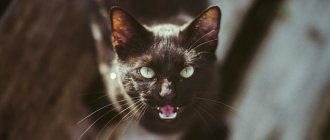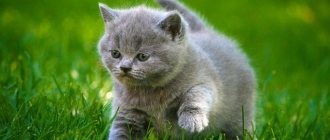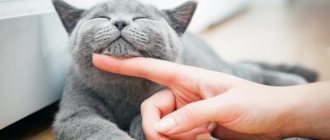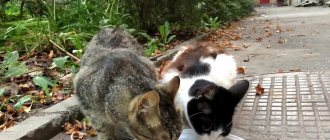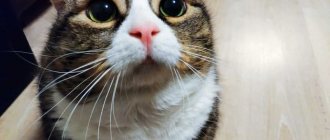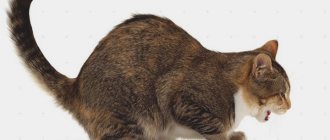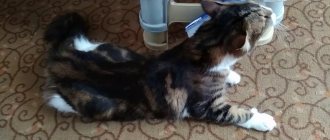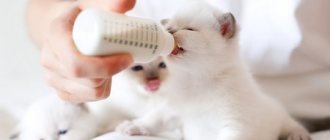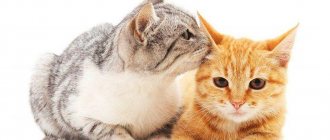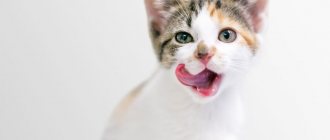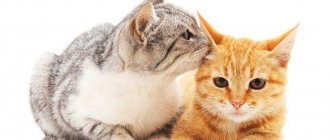11062Administration
1
Experienced furry pet breeders know how much their pet will eat in one meal. You should not give your furry pet too much food or gradually increase the usual portion. Of course, this does not apply to a small kitten, which is constantly growing and developing. This also does not apply to pregnant and lactating individuals, who need adequate nutrition for the healthy growth of future kittens.
But if it happens that a mature individual constantly wants more after eating, this phenomenon is not considered the norm. Why does my cat constantly ask for food? You will find the answer to this question in our article.
Reasons why a cat doesn't eat well
In fact, you shouldn't always panic when your cat doesn't eat anything for a couple of days. Especially in cases where the animal does not look exhausted, does not have a fever, and there are no signs of an upset stomach or other malfunction of the body. The most common reasons why a cat doesn’t eat anything:
- Abrupt transition to new or unusual food.
Cats have their own taste preferences, just like people, so even high-quality food suddenly introduced into the diet can cause food refusal. The owner should always carefully study the composition of the food, the manufacturer’s recommendations for feeding, and remember that the new product is introduced gradually, only being mixed in small quantities with the old one that is familiar to the animal.
This situation can also happen when a cat that is accustomed to industrial food is switched to natural food. It is unlikely that a cat that has eaten dry food will happily eat, for example, vegetables with meat or cottage cheese. But if it’s just a matter of changing the usual diet, then there is no need to worry, the cat is simply not yet accustomed to the innovations in its menu. The animal itself does not look sick; it does not have diarrhea, vomiting, or excessive discharge from the eyes or nose.
Stressful situations.
Cats are sensitive animals; just like people, they can be sad, worried, or afraid of something. In a stressful situation, it may be quite normal to refuse food for a couple of days, feel depressed, and apathy. In this case, it would be a good idea for the owner to first try to find out what is the cause of the animal’s suffering, eliminating it if possible. If the situation cannot be corrected (the death of someone dear to the animal, the appearance of a new pet in the house, etc.), then it will take time and participation in the cat’s life on the part of the owner. You may need to consult a veterinarian, as well as purchase sedatives for purring.
Weather.
When the temperature outside the window exceeds 30 (or even 40) degrees, even the most voracious animal can look for a patch of shade on the street or lie exhausted on the floor, forgetting about food. In such cases, you should not force feed the cat and lament why it refuses to eat. On the hottest days, it is better not to overload the animal’s body, however, clean drinking water at such times is more important than ever.
The owner does not monitor the cleanliness of the animal’s bowls.
Cats are one of the cleanest animals, so the owner should wash all cat dishes after each feeding or at least once a day. Dirty plates, bowls with dried food debris, ants crowding around, and the smell of sour food can make a cat refuse to eat. In addition, neglect of cleanliness can lead to various diseases.
Hormonal surge.
When the animal's body undergoes restructuring during puberty, during estrus and pregnancy in cats, the owner may observe a refusal of food in the pet. During the period of cat spree, animals may not eat for up to a week, especially females. The owner should not worry, since the cat’s appetite will return to normal as soon as the animal calms down, and the problem of hormonal changes will be solved by itself. It may not be superfluous to purchase vitamins depending on your doctor’s recommendations.
Helminthiasis or the presence of external parasites in a cat.
The owner should remember that the presence of worms, as well as external bloodsuckers (most often fleas) can cause many problems for the animal. All parasites multiply at enormous speed, and then with their offspring they feed on the blood of the animal and poison its body with the products of their vital activity. The cat's owner should take preventive measures to ensure that the four-legged friend's body is free of worms and fleas, and also monitor the cleanliness of the room. If the owner suspects that the cat has worms, then the following symptoms will become alarming: diarrhea, cough, vomiting. Fleas can cause the following unpleasant conditions for a cat: poor sleep, thinning fur, itching from bites.
There are many pieces of fur accumulated in the cat's stomach.
In cases where an animal actively licks itself, a large amount of hair accumulates in its stomach. This problem is especially acute when the owner does not comb out the pet’s fur. Vet pharmacies sell special products that prevent the formation of hairballs, which can be purchased by the cat owner. In addition to refusal to eat, this problem is also characterized by stool disorders and vomiting.
The role of water in the diet
The cat asks the cat: options for how to calm it down at home
The cat must have constant access to clean water. This is especially important if your pet eats dry food. If the animal's fur is shiny and silky, and it urinates at least twice a day, then there is enough water.
Clean water is essential when feeding kibble.
What should an owner do if a cat doesn’t eat well?
If the cat feels cheerful and cheerful, has normal bowel movements, and the hunger strike lasts no more than 2 days, then the owner can be calm. It would be a good idea to try to gradually introduce some new foods into the diet, depending on what your cat’s diet is. If the animal eats natural food, then it makes sense to offer it some new but healthy products. If your animal's menu included industrial food, you can purchase a new type - for cats that are picky eaters. But any food should be introduced gradually and the animal should not be forcefully fed.
A good appetite is always considered an indicator of health, so many owners begin to sound the alarm when their beloved pet eats poorly or refuses to eat at all. But refusal to eat is not always a sign of illness or behavioral disorders; sometimes it is a normal condition. You need to learn to understand why the cat does not eat in order to provide the correct help to the cat in time if necessary.
Feeding recommendations
To avoid cat obesity, the food bowl should not be available all the time. This is due to the fact that it is very difficult for cats to stop at the sight of food. Regular overeating is fraught with serious diseases, as a result of which cats cease to feel full and the cat constantly wants to eat. Feed the animal no more than three times a day ; a bowl of clean water should be constantly in sight of the animal. A variety of foods are very harmful to your pet’s stomach: dry food, wet food, food from the common table. It is necessary to feed your cat one type of food for a long time.
If a cat constantly hungry , although she is well fed, what is this symptom ? And what to do in such cases?
The question is, what are you feeding? If you are feeding her or have recently fed her Whiskas Kitekata, but then you gave up this poisonous food, then perhaps she got it from these foods. You need to feed only raw chicken or horse meat. Other types of meat are not desirable for cats, and even harmful. Meat should only be given to meat that has been heavily frozen and has been left there for at least a couple of days. Microbes and worm eggs die in frozen meat. Cats should not eat boiled food. Do not give dry food, as it spoils the cat’s stomach if she does not drink water after such food, she will vomit constantly. In general, any food, even premium class like Royal Canin, is very harmful for pets since they are made from dead pets and livestock, and from all sorts of bio-waste, and dyes and flavors are added for taste and color. Why did I write all this? My cat, too, didn’t eat enough all the time. I fed her kitekat for half a year. I ruined everything for her there, when I stopped this misfortune, I feel sorry for her, so when she starts to beg so much, I give him raw chicken meat, not fatty, always without skin and fat. I feed on average about 3 times a day. It was better before 5-6 times. Another reason is that your cat may have worms, but do not buy anthelmintic yourself, this can cause the cat to die in agony, almost all funds are available very toxic on the Russian market, only on the recommendation of a veterinarian and let him explain in what doses, you need to strictly follow the dose to avoid death. Third reason: She may have fur in her stomach and not let food pass (does vomiting happen?) If it happens and often means a lot of hair licks it off and it clogs her entire digestive system, and nutrients from food are not absorbed by the stomach, you need a special cat paste in a tube, it removes hair (the composition is natural). And even if you feed only meat, which is natural for cats and healthy then you need to buy vitamins for the cat, they are needed so that the hair does not fall out and so that it looks good and feels normal. In its natural environment, a cat does not need vitamins because it eats mice and birds, along with bones and entrails and raw ones, and from there it gets the necessary ones substances for her. It has always been like this. There is no need to invent anything new. I feel sorry for the cats who suffer from the modern world. For her, clean water should always be freely available in an enamel, porcelain or glass container, you need to give grass from the street that cats usually eat, but so that it is clean and removed from places where street animals do not go to relieve themselves. I am very much inclined towards the first reason. I think you feed it with cat food. Although of course I could be wrong.
Surely every cat owner knows the approximate portion of food that a pet can eat in one sitting. He also knows the special preferences of his pet, what the furry beauty likes most.
How long can a cat go without eating? What are the dangers of starvation?
These are approximate dates, taking into account that the animal drinks enough these days. Longer fasting or fasting while refusing to drink is dangerous for the life of a pet.
A kitten under 6 months of age can die within 24 hours of fasting, so if the kitten does not eat, it must be force-fed.
In addition to the risk of death, refusing to eat can cause the following health problems:
- severe weight loss;
- exacerbation of any chronic diseases;
- avitaminosis.
Cat nutrition standards
As you know, there are two types of cat food: dry and wet. Feed rates depend on age, breed, health status, and body weight. The last factor is the most significant.
Proper nutrition of animals is the key to their health
For your information! The daily intake of wet food is on average 5% of the animal’s body weight.
The amount of dry food is calculated taking into account the pet’s weight:
- up to 3 kg - 25 g;
- from 3 to 4 kg - 40 g;
- 4-5 kg - 55 g;
- with a weight of more than 5 kg - 12 g per 1 kg of body weight.
For the first 4-5 weeks, kittens eat only cat’s milk and determine the amount of food they need. Then small pets can be fed with high-quality dry and wet food, which is more balanced in composition than homemade food. Its quantity also depends on several factors.
Important! It would be best to use the dosing table, which manufacturers usually place on the packaging.
The main reasons why a cat refuses to eat
- Stress.
- Changing your diet.
- Thermoregulation.
- Sexual instinct.
- Pregnancy.
- Parasites.
- Oral diseases.
- Poisoning.
- Foreign body and fur in the stomach and intestines.
- Viral infection.
- Diseases of the liver, kidneys and urolithiasis.
- Postpartum period.
- Consequences of anesthesia.
Stress
Cats are exposed to stress no less, and perhaps even more than people. Moving to a new place of residence, a new bowl, rearranging the room, renovations, a business trip for the owner, or mood swings of the owner - all these are stressful situations for the animal.
Even the arrival of guests or a quarrel between family members can affect the cat’s well-being.
During stress, the cat is not active, she has an apathetic mood, she does not want to play with the owner, she eats poorly or refuses to eat at all. In such a situation, there is no need to force the animal to eat; refusing food for a couple of days is the norm.
Increased attention to the cat from family members, affectionate treatment, and new toys help in stressful situations. In severe cases, consultation with a veterinarian is necessary, who can prescribe sedatives to the animal.
But be careful: the cause of stress may be the onset of an illness.
Changing your diet
New food is stressful in itself. Cats are very picky eaters and are sensitive to any change in diet. A sudden transition from one type of food to another, or a change in the brand of dry or wet food, can lead to the animal going on a hunger strike.
The animal does not understand that the new food is of better quality and cannot appreciate the efforts of the owner. The cat is accustomed to a certain food, so it declares a “boycott” on any unfamiliar food.
Monitor the condition of the animal; if the cat looks healthy and drinks enough water, then you should not worry too much about such a “hunger strike”.
Situation 2: the cat does not get enough of two meals a day, previously he ate food twice a day
“My cat wants to eat all the time. The feeling that he simply does not get enough of natural food. When I was at the stern, I ate twice a day and didn’t ask for extra. Now he follows me around all day and looks at me with pitiful eyes. He eats 5% of his weight, that is, according to science. Does he really need more? What if he gets fat then? The cat asks for food - does it mean he’s missing something?
Most likely, this condition will pass some time after switching to a natural diet. Many cats are delighted with raw meat, because it is the right food, so at first they try to eat more. In addition, the body also needs to be rebuilt. There is a study that shows that by eating approximately the same food for 2-4 weeks, the cat gets used to it - and its body learns to regulate activity in accordance with the amount of energy supplied by the food. At the same time, the body gets used to a certain amount of food and learns to get enough of it. That is, a kind of adjustment of the body to the proposed type of nutrition occurs. The situation usually returns to normal within 1-3 months.
But it’s still worth analyzing the cat’s activity and condition. If you see a lack of body weight (ribs and spine stick out) or the cat is overly active, then perhaps he is missing 5%. Then the amount of food can be increased slightly or made more caloric. Lean pork, chicken heads, and poultry thighs with skin help with this.
If the cat is in normal condition, he is well-fed, and his activity is so-so, in addition, the animal is castrated, which is why it may also feel an excessive appetite, it does not need additional food. Then you can resort to tricks to better saturate your cat with food of the same calorie content. For example, if you serve meat in small or medium-sized pieces, try cutting them larger. When a cat has to try hard to eat the “prey”, work hard with its jaw, it takes longer - then the animal realizes faster that it is full. Similar mechanisms operate in humans. Secondly, active jaw activity is an important element of eating due to a number of neurophysiological reactions, which results in increased levels of happiness and decreased stress.
What is this phenomenon?
If a cat constantly asks for food, then this change in eating behavior is called polyphagia. This is a pathological condition caused by:
- gluttony and stretching of the stomach walls;
- lack of nutrients during the active growth of a young animal;
- the body's reaction to medications;
- stress or prolonged feeling of discomfort;
- cold season;
- decreased metabolism in old age.
- I want to eat.
Polyphagia can develop at any age. If your cat has been eating a lot lately, although this was unusual for him before, the reason should be identified as soon as possible.
Attention! Stressful situations and prolonged lack of appetite subsequently provoke polyphagia in cats. After a hunger strike, they try to make up for the lack of nutrients without feeling full.
Diabetes
In diabetes mellitus, nutrients are not absorbed in the body, which causes energy deficiency.
The disease is characterized by the development of metabolic pathologies that provoke absolute or relative insulin deficiency. As a result of such a disease, metabolic processes of all systems are disrupted. There is a failure of carbohydrate, fat, protein, mineral and water-salt balance.
Despite the efforts of the owners and the good diet of the animal, nutrients cannot be absorbed into the body, since a lack of glucose provokes an energy deficit for this process. And glucose itself is absorbed only with insulin, which is not enough as a result of a failure of metabolic processes.
Symptoms
One of the symptoms of diabetes is constant thirst.
- With excessive appetite, the pet sharply loses weight, and the amount of urine output increases.
- Peripheral neuropathy manifests itself - the animal walks, leaning on the entire foot, the gait is uncertain, unsteady.
- The cat becomes weak, lethargic, and reluctant to make contact.
- The smell of acetone is felt from the oral cavity, the skin becomes thinner, the coat is disheveled, dull, a sickly appearance and a dull look.
Treatment
A properly selected diet is the key to successful treatment of a cat.
It is recommended for pets who have recovered from this diet to remain on this diet for the rest of their lives. Sugar-lowering tablets and insulin injections are used.
If diabetes is suspected, the owner can independently check the sugar level. To do this, you will need to conduct a test using special urine strips. It is also possible to use a veterinary glucose meter to check your blood sugar levels. The physiological indicator of sugar in the urine is its absence. In the blood - from 3.3 to 6 mmol/l.
When is there nothing to worry about?
All of the listed symptoms of cat gluttony are removable and should not cause concern to owners unless severe exhaustion/obesity, vomiting after eating, or deterioration in the condition of the coat and teeth are observed. Polyphagia can be overcome by properly organizing the feeding of the purring cat.
During the period of active growth and development, which lasts about 2 years, kittens have a great need for nutritious, balanced food. They spend a lot of energy and try to replenish it by eating more than normal. If the kitten eats a lot, grows quickly and remains energetic and playful, then there is nothing to worry about.
Babies need a lot of energy
Peculiarities of eating behavior also depend on the breed, so owners should be aware of their cat’s daily calorie requirement, as well as how this parameter changes depending on the pet’s age.
Female felines may experience an increased appetite after the end of estrus, when they try hard to make up for the lack of calories by eating. During heat, a cat completely loses its appetite due to nervousness, but subsequently they simply eat up, absorbing food in unlimited quantities.
Attention! Older cats show more interest in food than young cats. An active, non-obese pet with a slightly increased appetite should not cause concern.
The cat constantly wants to eat during pregnancy and feeding
A female cat bears babies for an average of nine weeks. Any deviations from the given norm in one direction or the other are quite acceptable and depend on: breed, physical activity, physiological state. If the female cannot give birth after the seventieth day, you should immediately consult a doctor.
It is noteworthy that at the very beginning of pregnancy, the animal, on the contrary, begins to eat less; this is most likely due to toxicosis.
Increased appetite occurs around the fourth week of pregnancy, although this is not a categorical statement. For each individual individual, the process occurs purely individually. In this case, it is recommended to switch the female to ready-made food designed specifically for pregnant cats. It contains the entire complex of useful substances required in such cases.
It is recommended to feed a pregnant cat with special food containing beneficial substances.
About the same thing happens when feeding kittens. The mother's appetite depends on the number of offspring, as well as on the amount of milk. A ready-made balanced special food will eliminate the problem.
Pathological causes
There are also pathological reasons why a cat eats a lot and does not get enough, signaling serious changes in the body. This:
- impaired absorption of beneficial components due to congenital characteristics of the body or the presence of serious diseases - inflammation and intestinal cancer, exocrine insufficiency, pancreatic tumors;
- diabetes mellitus, which often affects pets;
- pregnancy and breastfeeding;
- helminthic infestation.
If the cat's constant hunger is not associated with pregnancy and worms, it requires specialized veterinary care. The presence of serious diseases affects the appearance of the animal - the cat eats a lot, but loses weight, becomes capricious, loses interest in active games, and its fur and teeth become unattractive.
It may be worth contacting a veterinarian
As a rule, most diseases respond well to treatment and require a balanced diet using special foods. You can detect the presence of the disease yourself, simply by observing your pet: the fact that the cat is always hungry, drinks a lot and often goes to the toilet indicates diabetes.
Problems with the gastrointestinal tract are indicated by vomiting and diarrhea. Of course, only a doctor can prescribe treatment!
No. 3 The cat eats quickly, but then asks for more
This behavior can be detected in a cat that has been starving for a long time. Greed for food and eating it without even chewing are signs that may suggest the sad past of a pet who has known a hungry life on the street.
Here the hunger has an exclusively psychological reason - the cat is afraid that the food will run out and the next one will not be given. If so, you need to eat for future use.
What to do?
If the cat asks to eat more than the norm, then you can:
- change the food to a more expensive and nutritious one. Cheap economy class mixtures do not contain the vitamins, minerals, and biologically active substances necessary for normal growth and development of the animal. Their deficiency in the cat’s body provokes overeating;
- do not feed in excess of the norm, focusing on the instructions for consuming food, the age and physiological characteristics of the cat;
- organize fractional feeding at the same time - 2-3 times a day;
- eliminate unscheduled snacks that are skillfully begged for by cunning manipulative cats.
A pregnant cat must be fed with specially formulated food that contains the full range of essential nutritional components or the diet must be further enriched with vitamins and minerals. As a preventive measure and to get rid of parasites, regularly administer anthelmintic drugs.
Diabetes mellitus and intestinal diseases require diagnosis and drug treatment. You should also contact a veterinarian if, despite all efforts, the cat constantly asks for food, and its appearance leaves much to be desired.
Should I restrict my pet's food?
What to do if your furry pet has an increased appetite? If the cat tries to get an additional portion of food, you need to go to the veterinarian for consultation. Based on some tests, a specialist must exclude possible diseases.
Please note that the cat must be fed exclusively with premium food.
The fact is that cheap food does not contain enough nutrients. It is for this reason that most often pets are hungry. If the animal does not have problems with excess weight, you can not limit its food intake , provided that the furry pet does not have diseases. If you still have problems with excess weight, you should plan your meal schedule and reduce the portion size. If your pet is energetic and active enough, there is no reason to worry.
